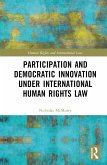This book examines how the European Convention of Human Rights system and the Strasbourg Court interact with states and non-governmental actors to influence domestic change, focusing on European Court of Human Rights litigation and state implementation of judgments related to minority discrimination and asylum/migration.
'Through the lens of legal experimentalism, this compelling book analyzes immigration and minority policies and the European Convention of Human Rights. Law emerges from a transnational process of continuous contestation and learning of international legal institutions and local and national actors. Because it offers an instructive contrast to the experimentation movement in the social sciences, this highly original and carefully developed application of the experimentalist turn appeals to readers interested in both European law and general legal and social analysis.'
Peter J. Katzenstein, Walter S. Carpenter, Jr. Professor of International Studies, Cornell University
'This is an innovative and impressive book, which analyzes the functioning and effectiveness of the European Court of Human Rights in the area of minorities and migrants' rights from an "experimentalist" perspective, and with particular focus on civil society mobilization. During a time of populist and nationalist illiberalism, the author presents a compelling theory of the effectiveness of strategic litigation before the ECtHR in these two important fields. The book should be of great interest to lawyers and political scientists who want to understand the role of courts and litigation in social change, and particularly to those interested in examining the effectiveness of regional and international human rights systems.'
Gráinne de Búrca, Florence Ellinwood Allen Professor of Law, New York University School of Law
Peter J. Katzenstein, Walter S. Carpenter, Jr. Professor of International Studies, Cornell University
'This is an innovative and impressive book, which analyzes the functioning and effectiveness of the European Court of Human Rights in the area of minorities and migrants' rights from an "experimentalist" perspective, and with particular focus on civil society mobilization. During a time of populist and nationalist illiberalism, the author presents a compelling theory of the effectiveness of strategic litigation before the ECtHR in these two important fields. The book should be of great interest to lawyers and political scientists who want to understand the role of courts and litigation in social change, and particularly to those interested in examining the effectiveness of regional and international human rights systems.'
Gráinne de Búrca, Florence Ellinwood Allen Professor of Law, New York University School of Law








